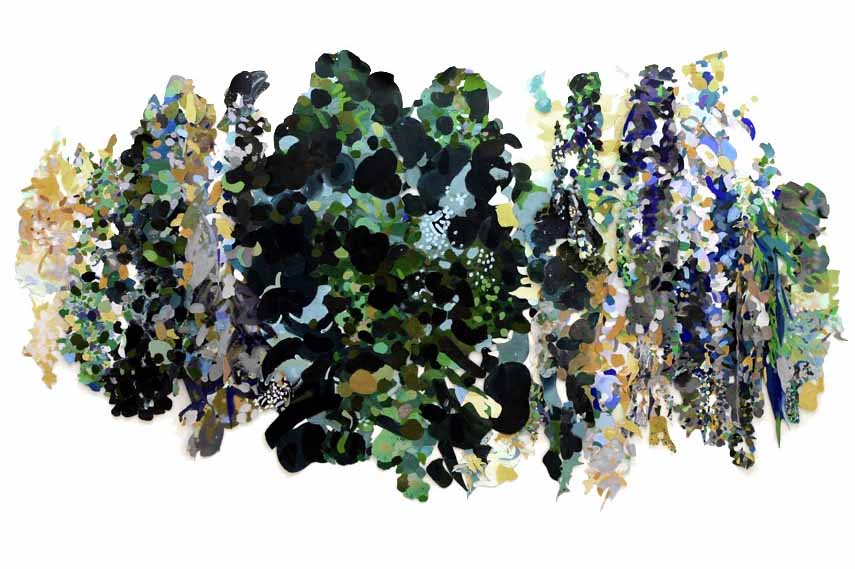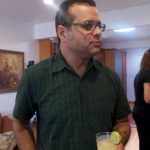
Samia Halaby (Palestine), Palestine, from the Mediterranean Sea to the Jordan River, 2003. Photo: The Tricontinental.

Orinoco Tribune – News and opinion pieces about Venezuela and beyond
From Venezuela and made by Venezuelan Chavistas

Samia Halaby (Palestine), Palestine, from the Mediterranean Sea to the Jordan River, 2003. Photo: The Tricontinental.
By Vijay Prashad – Jun 29, 2023
On 24 June 2023, Chief of Staff of the Israeli Defence Forces (IDF) Herzl Halevi, Chief of Shin Bet (Intelligence) Ronen Bar, and Police Commissioner Kobi Shabtai released a joint statement. They pointed to ‘violent attacks… by Israeli citizens against innocent Palestinians’, which they characterised as ‘nationalist terror in every sense’. Such a statement is rare, particularly the description of the violence as ‘nationalist terror’ and the rendering of Palestinian victims as ‘innocent’. Typically, high-ranking officials in the Israeli government portray such attacks as retaliation for terror attacks by Palestinians.
Three days before this statement, the US government said it had heard ‘troubling reports of extremist settler violence against Palestinian civilians’. Settler groups – or, more accurately named, Israeli nationalist terrorist groups – have been running rampages across the West Bank alongside the Israeli armed forces, killing Palestinians at will to sow fear in this part of Palestine and urging further ethnic cleansing, euphemistically referred to as ‘demographic engineering’.
Israeli violence against Palestinians is not new, but it has been escalating rapidly. From January to May of this year, the United Nations calculated that Israeli forces have killed 143 Palestinians (112 in the West Bank and 31 in Gaza) – more than twice the number of Palestinians killed in the same period last year. In 2022, 181 Palestinians were killed in total (151 in the West Bank and 30 in Gaza). Meanwhile, UN agencies found that 2022 was the sixth year of consecutive annual increases in settler attacks, which have been rising since 2006, after the Second Intifada was crushed by Israel. In 2009, the UN warned that 250,000 Palestinians in 83 communities in the West Bank ‘are at risk of heightened violence’ from Israeli settlers. They called these ‘price tag’ attacks because the settlers want to exact a high price from Palestinians for their existence in lands that Israelis call Judea and Samaria.
![]()
Tayseer Barakat (Palestine), Shoreless Sea #11, 2019.
At a cabinet meeting on 25 June, Israeli Prime Minister Benjamin Netanyahu told his colleagues that he too found the ‘calls to grab land illegally and actions of grabbing land illegally’ to be ‘unacceptable’. A close reading of Netanyahu’s statement to the cabinet finds, however, that he did not differ with the policy of land grabs and demographic engineering. The violent actions of the settlers, he said, ‘do not strengthen settlement – on the contrary, they hurt it. I say this as someone who doubled settlement in Judea and Samaria despite great and unprecedented international pressure to carry out withdrawals that I have not carried out and will not carry out’. These settlements, which Netanyahu extols, are illegal according to international law. As recently as 2016, the UN Security Council voted for resolution 2334, which ‘condemn[s] all measures aimed at altering the demographic composition, character, and status of the Palestinian Territory occupied since 1967, including East Jerusalem, including, inter alia, the construction and expansion of settlements, transfer of Israeli settlers, confiscation of land, demolition of homes, and displacement of Palestinian civilians’.
Over the past few years, a suite of policies and actions by the Israeli government has raised the spectre of apartheid, the Afrikaans word meaning ‘the state of being apart’. This term has increasingly been used to describe the institutionalised discrimination of Palestinians by Israel within the 1948 lines of Israel, in the Occupied Palestinian Territory (the OPT, which is made up of East Jerusalem, Gaza, and the West Bank) from 1967, and exiled in the diaspora. In 2017, the UN’s Economic and Social Commission of West Asia (ESCWA) published a strong report, Israeli Practices towards the Palestinian People and the Question of Apartheid. ESCWA’s then leader, Rima Khalaf, said that Israel’s apartheid regime works on two levels. First, it fragments the Palestinian people (inside Israel, the OPT, and the diaspora). Second, it oppresses Palestinians through ‘an array of laws, policies, and practices that ensure domination of them by a racial group and serve to maintain the regime’.
The use of the word apartheid to describe Israel’s treatment of Palestinians is now nearly ubiquitous. Amnesty International, for instance, published a 2022 report with a powerful title: Israel’s Apartheid against Palestinians: Cruel System of Domination and Crime against Humanity. In a blunt conclusion, Amnesty wrote:
Israel has perpetrated the international wrong of apartheid, as a human rights violation and a violation of public international law wherever it imposes this system. … [A]lmost all of Israel’s civilian administration and military authorities, as well as governmental and quasigovernmental institutions, are involved in the enforcement of the system of apartheid against Palestinians across Israel and the OPT and against Palestinian refugees and their descendants outside the territory.
![]()
Dina Mattar (Palestine), Untitled 1, 2019.
From 20 to 22 June, two former senior UN officials, Ban Ki-moon (former UN secretary-general) and Mary Robinson (former UN High Commissioner for Human Rights and president of Ireland), visited Palestine and Israel. They went to the region on behalf of The Elders, a group formed by Nelson Mandela in 2007 to bring together former government staff and top officials from multilateral institutions to address the dilemmas of humanity. When they left Tel Aviv, the two Elders published a scathing report on their visit.
Based on their conversations with human rights organisations and their own investigations, Ban and Robinson pointed to the ‘ever-growing evidence that the situation meets the international legal definition of apartheid’. When they discussed this evidence with Israeli officials, they ‘heard no detailed rebuttal of the evidence of apartheid’. The Government Guidelines for Netanyahu’s cabinet, Ban and Robinson pointed out,
clearly show an intent to pursue permanent annexation rather than temporary occupation, based on Jewish supremacy. Measures include the transfer of administrative powers over the occupied West Bank from military to civilian authorities, accelerating the approval processes for building settlements, and constructing new infrastructure that would render a future Palestinian state unviable.
These are powerful words from senior officials who held two of the highest offices of the United Nations.
![]()
On 25 March 1986, the Israeli authorities arrested Walid Daqqah, who is from the town of Baqa al-Gharbiyyeh. He was sentenced to 37 years in prison for being part of a group that killed the Israeli soldier Moshe Tamam. His imprisonment violates the Oslo Accords of 1993, which say that all Palestinian prisoners held before the signing of the agreement must be released. His 37-year prison term expired on 24 March 2023, but Daqqah, who since his imprisonment has become an accomplished novelist, remains incarcerated on a new charge from 2018 for smuggling cell phones into the prison. This extended his sentence by two more years. Now 61 and battling cancer (a diagnosis he received in 2022), Walid was scheduled for a parole hearing, but this has been postponed by the Israeli government.
Amidst increasing international outcry, the International Union of Left Publishers, of which Tricontinental: Institute of Social Research is a member, has released a statement calling upon the Israeli government to release Daqqah. Please read it below:
We, the International Union of Left Publishers (IULP), call on all publishers, writers, artists, intellectuals, and people of conscience to demand the immediate release of the revolutionary writer and thinker Walid Daqqah from the jails of the Israeli Occupation.
Walid Daqqah has been imprisoned since the age of 25 for his resistance to the Israeli Occupation and his defence of the Palestinian people. Now 61, he has endured this unjust imprisonment for 37 years. His medical condition is rapidly deteriorating, and it is critical that he receive a bone marrow transplant and other urgent medical care, but he has been denied medical treatment by the Israeli authorities.
As one of the most important thinkers and visionaries of the Palestinian resistance today, Walid Daqqah has been subjected to extra levels of the routine torture, abuse, and neglect that Palestinian prisoners face in the Occupation’s jails. He is a voice of the people, a voice that the Occupation fears and hopes to silence. But though his body is behind bars, his voice has broken free through his novels, essays, and letters, which have nourished and motivated the Palestinian prisoners’ movement, the resistance, and the international solidarity movement in all corners of the world. Walid Daqqah’s imprisonment is a violation of his most basic human rights, those of his family and of his people, and also a violation of the rights of all people in struggle who deserve to learn from, listen to, and exchange with him and his ideas.
The ongoing imprisonment of Walid Daqqah is a sentence to death, and the world is witness to the US-backed Israeli Occupation’s attempts to silence the Palestinian resistance by any means possible. We demand the immediate release of Walid Daqqah to his family and immediate access to medical care. We raise our voices in firm solidarity with Walid Daqqah, the almost 5,000 Palestinian prisoners who remain unjustly behind bars, and the imprisoned and repressed voices of reason who suffer from the attacks of imperialism across the world.
In 2018, Daqqah published his first novel for children, The Oil’s Secret Tale. It tells the story of 12-year-old Jood, who goes to see his father in prison for the first time but is denied access by the authorities. The boy travels around Palestine, meeting with Samour the rabbit, Abu Reesha the bird, Ghanfour the cat, Abu Nab the dog, and an ancient olive tree, Um Rami, and speaking about the Israeli apartheid regime. Um Rami, who was to be felled by the Israeli authorities to free up land for an illegal settlement, tells Jood that she has an oil he can rub on his body to make him invisible. He uses the oil, walks into his father’s cell, and says to his bewildered father, ‘I am your son Jood’.

Vijay Prashad is an Indian historian, editor and journalist. He is a writing fellow and chief correspondent at Globetrotter, a project of the Independent Media Institute. He is the chief editor of LeftWord Booksand the director of Tricontinental: Institute for Social Research. He has written more than twenty books, including The Darker Nations: A People’s History of the Third World (The New Press, 2007), The Poorer Nations: A Possible History of the Global South (Verso, 2013), The Death of the Nation and the Future of the Arab Revolution(University of California Press, 2016) and Red Star Over the Third World (LeftWord, 2017). He writes regularly for Frontline, the Hindu, Newsclick, AlterNet and BirGün.
Support Orinoco Tribune team’s unique, amazing, and unmatched work!
5.5 years providing honest and responsible anti-imperialist information about the Global South!
66 months working for you, 18.5K posts published, 60 original pieces in the last 4 months, 21 YouTube interviews over the last 12 months, and much more to come!
Your donations make a big difference!
You must be logged in to post a comment.